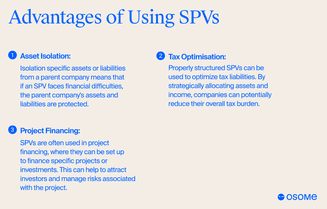Special Purpose Vehicle Explained: Benefits, Risks, and Practical Uses of SPVs
- Published: 22 October 2024
- 11 min read
- Starting a Company


Heather Cameron
Author
Heather believes in the power of great storytelling and is here to craft compelling copy that informs and inspires readers. With an extensive background in digital marketing, she has experience writing for various industries, from finance to travel. As Osome’s copywriter, Heather creates content that empowers entrepreneurs and small business owners to boost their business with expert guidance, helpful accounting tips and insights into the latest fintech trends.

Yinghua Luo
Reviewer
Yin Luo is our Operations Manager based in the UK. She keeps our UK team running like a well-oiled machine and ensures our content resonates with our British audience. Before moving to operations, Yin had over 10 years of accounting experience and is an ACCA-qualified accountant. In her current role, she is our go-to expert for making complex topics easy to understand. Yin carefully reviews our UK-focused articles, ensuring they are accurate, relevant, and packed with actionable advice to help your business thrive on this side of the pond.
A Special Purpose Vehicle (SPV) is a separate legal entity often used by companies to manage financial risk independently. This article covers what an SPV is, its benefits, challenges, and practical uses.
Key Takeaways
- Special Purpose Vehicles (SPVs) are independent legal entities designed to isolate financial risks and manage specific assets separately from the parent company.
- SPVs provide several benefits, including tax efficiency and capital raising opportunities, but can also pose challenges related to regulatory compliance and potential misuse.
- SPVs are commonly used in real estate and venture capital settings, enabling structured investment strategies while protecting the parent company’s financial integrity.
What Are Special Purpose Vehicles (SPVs)?
A Special Purpose Vehicle (SPV) is primarily created to isolate or securitise a parent company's assets, thereby limiting financial risks for the parent company, which is considered a separate legal entity. These entities function independently, with their own assets, liabilities, business operations, and financial standings distinct from the parent company.
SPVs have a degree of autonomy. However, they must still adhere to the same laws and regulations that apply to other private funds. This adherence to legal standards ensures a structured and compliant operational framework.
Considering forming a Special Purpose Vehicle? Osome offers comprehensive company registration services to guide you through the process. We'll handle the legalities and ensure your SPV is set up for success. Contact us today to learn more!

Definition of SPV
An SPV, or Special Purpose Vehicle, is a distinct legal entity created with the specific business purpose of isolating financial risks. With their own legal status and financial standing, they can operate independently even if the parent company faces financial distress.
An SPV primarily manages specific assets and liabilities independently from the parent company, ensuring that the parent company’s financial health remains unaffected by the SPV’s performance. They are often used to manage and share project risks with those who invest.
Common uses of SPVs
SPVs are commonly utilised to isolate financial risk, securitise assets, and conduct separate financial transactions. One primary use is the securitisation of loans, providing an independent structure in financial management.
Landlords often use SPVs when investing in property like buy-to-let or holiday rentals, ensuring clear ownership and liability management in the context of leased real estate. Venture capital managers also employ SPVs to establish a track record and manage hard-to-transfer assets.
How Special Purpose Vehicles Work?
The mechanics of an SPV involve creating a separate legal entity to isolate financial risk. SPVs allow a company to conduct off-balance sheet finance, enabling them to invest in projects without significantly affecting the parent company’s financial health. This can improve the parent company's financial statements by reducing reported debt levels. SPVs provide a layer of protection for the parent company from financial risks, including debt and finance concerns, associated with certain projects or assets. This makes them attractive vehicles for any company looking to finance and invest in high-risk ventures. However, while they can offer a clearer financial picture, each company must pay careful attention to managing SPVs properly to prevent potential financial misrepresentation.
An SPV functions independently from its parent company yet can benefit from the same credit standing in some cases, maintaining the integrity and financial stability of both entities.
Financial structure
An SPV has its own balance sheet and its own legal status, with all assets, liabilities, and equity recorded separately from the parent company, ensuring that the SPV’s financial performance does not directly impact the parent company’s balance sheet.
The most significant advantage of an off-balance sheet treatment for a specific purpose entity is that it allows a private company to isolate financial risk and financing associated with specific projects or assets. The parent company can, therefore, maintain a healthier balance sheet, which can improve the same credit rating and attract investment while still managing complex ventures in a controlled manner.
This financial independence is especially beneficial for property investment, allowing SPVs to manage specific assets and liabilities without impacting the parent company’s overall financial health.
Legal forms of SPVs
The legal structure of an SPV can include limited partnerships, trusts, and corporations. Common forms also include joint ventures and LLCs.
In the UK, private limited companies (Ltds) or corporations are often used for SPVs, especially for real estate investment. The choice of legal form should be tailored to the specific risk profiles and agreements of the involved parties.
Ensuring the SPV's ownership is not directly tied to the parent company is crucial for maintaining the integrity and financial separation needed for effective risk management.
Benefits of Using SPVs
SPVs provide significant benefits, allowing for risky ventures without impacting the parent company’s financial health. Often created as a bankruptcy remote entity, they can function independently even if the parent organisation faces financial distress.
SPVs enhance capital structures by attracting various investors through different classes of equity and debt instruments. They are also inexpensive and easy to set up, lowering barriers to entry, especially in the venture capital ecosystem.

Risk isolation
A key benefit of SPVs is their ability to legally separate financial risks, protecting the parent company from exposure related to specific projects. By segregating liabilities related to particular ventures, a company that is considered a bankruptcy remote entity can limit its overall exposure.
Transferring any valuable asset to a Special Purpose Vehicle (SPV) can shield them from creditors if the parent company faces insolvency, allowing for off-balance sheet financing and providing a layer of protection.
Tax efficiency
SPVs are subject to corporation tax instead of personal income tax, offering significant tax advantages. Additionally, SPV mortgage interest tax relief has been changed to a flat 20% tax credit, which can pay off for SPVs involved in property investments and mortgages.
After forming an SPV, registration for corporation tax with HMRC within three months is necessary to ensure all tax-related benefits are leveraged.
Capital raising
SPVs attract independent equity investors, fund managers, and venture capitalists to support investment in high-risk assets without affecting the parent company’s financial status. Limited Partnership SPVs (LP SPVs) are recognised globally, aiding international capital-raising efforts.
SPVs can issue bonds and access additional capital independently from the parent company’s finances. In venture capital, SPVs allow those who invest to pool resources to raise additional capital for investing in single assets, such as startups, enhancing liquidity and portfolio diversification.
Risks and Challenges of SPVs
While SPVs offer numerous benefits, they also come with inherent challenges. Misuse and regulatory compliance are significant concerns. Isolating certain assets in an SPV can mitigate risks but may attract scrutiny from tax authorities and regulators, potentially harming the parent company’s reputation.
Misuse and scandals
The Enron scandal is a notorious example of Special Purpose Vehicle (SPV) misuse. Enron transferred stock to SPVs in exchange for cash or notes, resulting in significant financial misrepresentation and contributing to its financial collapse, highlighting the dangers of improper SPV management.
SPVs can mask crucial information from investors, potentially hiding risky financial positions and complicating risk assessment. Thorough due diligence is vital to uncovering the structural complexities of SPVs and ensuring transparency in financial reporting.
Regulatory compliance
SPVs must adhere to the same regulatory requirements as other private investment funds, requiring strict compliance protocols. Regulatory oversight can limit operational flexibility, affecting the SPV’s ability to adapt to changing market conditions.
Documenting the decision-making process for Special Purpose Vehicle (SPV) investments is crucial for compliance and effective risk management, ensuring all financial activities are transparent and meet regulatory standards.
What Is the Purpose of SPVs?
The primary purposes of SPVs include facilitating joint ventures, managing financial exposure, and expediting project completion by leveraging private sector resources. They allow multiple parties to collaborate while limiting financial exposure for each entity, providing a structured and risk-managed environment for project execution.
SPVs offer increased control over deal terms and operational freedom compared to individual investments, making them a versatile financial management tool for a company.

Real estate investments
Experienced landlords with multiple properties and high personal income tax typically form SPVs for property investment. Using an SPV limited company in property investments limits liability, offering a safety net for those who own real estate.
Landlords use SPVs to hold properties, enabling them to sell the Special Purpose Vehicle (SPV) instead of an individual property, which can lead to tax advantages. Additionally, SPVs help manage risks by isolating liability at the limited company level and protecting the owners’ personal assets.
Venture capital
Unlike traditional venture capital funds that diversify across multiple investments, SPVs typically invest all capital into a single SPV limited company. This strategy allows for substantial investments in individual ventures, offering significant growth opportunities and returns.
By pooling investor assets for single investments, SPVs facilitate venture capital investments and enable angel investors, fund managers, and other investors to compete in larger deals, optimising liquidity and asset diversification and enhancing the fund’s reputation.
How To Set Up an SPV?
Setting up a Special Purpose Vehicle (SPV) typically involves registering the company with regulatory bodies like Companies House, requiring specific documentation and adherence to legal standards. The process can be straightforward but involves several steps and legal requirements.
Establishing clear exit terms from the outset can mitigate disagreements during investment realisation. Proper planning and consultation with legal and financial advisors are essential for smooth setup and operational efficiency.

Registration process
Registering an SPV (Special Purpose Vehicle) involves submitting annual accounts and clarifying ownership proportions to Companies House. Necessary documents include the Memorandum of Association and Articles of Association, along with information about the limited company directors and shareholders.
Selecting a unique company name for a limited company that complies with naming conventions and choosing the appropriate Standard Industrial Classification (SIC) codes are also crucial steps in the registration process. Learn more about these SIC codes here.
Costs involved
The total cost of establishing an SPV can range from approximately £ 50 to £ 500, depending on the complexity and whether professional assistance is required.
While additional costs for ongoing compliance and accounting exist, the benefits, such as potential tax efficiencies and risk management, often outweigh these expenses.
Key Considerations About SPVs for Investors
Investors should consider several key factors when dealing with SPVs, such as the financial performance of the trading company if both are under one structure. Using an SPV allows general partners to mitigate the impact of poor investment performance on the firm’s flagship funds.
Lenders typically prefer SPVs set up specifically for property investment. Establishing a new SPV requires careful planning, including consulting with an accountant for correct structure and compliance. The process is relatively short and straightforward.
Due diligence
Investors should perform thorough due diligence, including checking the financials of the SPV, analysing its asset holdings, investment strategies, and the ability to pay obligations independently from the parent company. Options, potential earnings, expenses, tax liabilities, tax advice and other professional advice from tax experts should also be considered by investors.
Verifying the existence of a distinct bank account for the SPV (Special Purpose Vehicle) is essential for ensuring financial independence and proper management of funds.
Exit strategies
Clear exit strategies are crucial for SPVs to ensure both investors and portfolio companies understand their terms. Alignment difficulties may arise when attempting to align limited partners (LPs) and portfolio companies on exit terms.
SPVs typically return money to investors in a shorter period compared to traditional VC funds, which can take up to ten years. Continuation funds or vehicles can be designed to hold specific assets when a VC fund is nearing the end of its lifecycle, providing a structured exit strategy.
Public-Private Partnerships and SPVs
Special Purpose Vehicles are often utilised in public-private partnerships to manage risks associated with large-scale infrastructure projects. These partnerships leverage the resources of a private company to expedite project completion while managing financial exposure.
SPVs are vital for investment, asset management, and securing financing for capital-intensive projects, absorbing financial issues, and enhancing project feasibility.
Financial exposure limitation
Companies and businesses form SPVs in public-private limited partnerships primarily to limit financial exposure and absorb risks. By maintaining separate balance sheets and establishing bankruptcy-remote status, SPVs provide a layer of financial protection. This structure allows a company to manage large-scale projects without endangering their core operations, ensuring that potential losses do not impact the parent company’s financial health.
Risk absorption
SPVs provide significant benefits by isolating risks associated with capital-intensive projects, allowing businesses to secure financing and invest without endangering their core operations. By creating a separate legal entity, SPVs limit financial exposure from potential losses, especially in large-scale developments.
However, while SPVs can effectively absorb financial risk, they also come with inherent challenges, such as regulatory scrutiny and transparency issues. Historical cases of misuse, like the Enron scandal, underscore the importance of robust risk management practices.
Navigating the complexities of setting up and managing an SPV requires expert guidance. Osome offers comprehensive company registration and advisory services. Our experts help you minimise risks and maximise the benefits of this strategic tool. Contact us today to learn more!
Summary
In summary, Special Purpose Vehicles (SPVs) offer a powerful means to isolate financial risk, enhance tax efficiency, and raise capital. They provide a versatile tool for managing projects and investments, particularly in real estate and venture capital. However, it is crucial to understand the challenges and regulatory requirements associated with SPVs to leverage their benefits effectively.
As you consider incorporating SPVs into your financial strategies, keep in mind the importance of thorough due diligence, clear exit strategies, and compliance with regulatory standards. By doing so, you can harness the full potential of SPVs to optimise your investments and safeguard your financial future.






